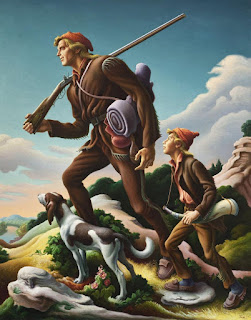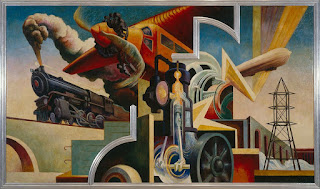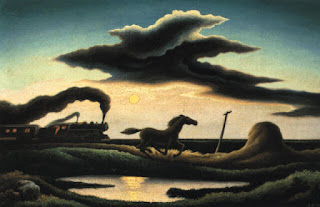American Painter and Muralist.
Born: April 15, 1889 - Neosho, Missouri
Born: April 15, 1889 - Neosho, Missouri
Died: January 19, 1975 - Kansas City, Missouri
Thomas Hart Benton was born in Neosho, Missouri in 1889 into a family of prominent politicians committed to political republicanism and populism. His father was a congressman, and his great-uncle, for whom he was named, was an important US senator. Benton later recalled that, "Politics was the core of our family life." Through his art, in particular his murals, Benton sought to continue his family's support of 19th-century political republicanism, upholding the producers of society, and scornful of big business and big banks. Expected to follow his family's well-trodden path, instead, with his mother's encouragement he chose to study art. Starting at age seventeen he worked as a cartoonist for a local paper. Escaping the confines of small town life and rebelling against the stifling expectations of his family, Benton moved to Chicago where he enrolled in the Art Institute of Chicago in 1907, studying under Frederick Oswald.
Thomas Hart Benton was one of America's most popular and heavily patronized modern artists during the decades leading up to World War II, and his murals were especially acclaimed. Along with Grant Wood and John Steuart Curry, Benton gained artistic fame as a Regionalist painter, depicting the people and culture of the American Midwest, in particular his native state of Missouri. While his subjects were primarily based in America's heartland, he lived in New York City for twenty years. Considered by many to be reactionary due to his outspoken and inflammatory diatribes against the art world, Benton, a populist, did in fact boldly use his art to protest the KKK, lynching, and fascism during the 1930s and 1940s. Benton was also an admired teacher at New York's Art Students League, offering students grounding in European art history, as well as an awareness of European modernism. The advent of Abstract Expressionism has all but eclipsed Benton's importance in the history of modern art.
KEY IDEAS
Benton's main contribution to 20th-century American art might be his thematic emphasis on images of ordinary people and common lore. His expressive realism stands out for its exaggerated curvilinear forms and shapes, and bold use of key colors. By shifting attention away from New York and towards the Midwest, Benton expanded both the scope of possible artistic subject matter, and the potential public for American art.
Benton's main contribution to 20th-century American art might be his thematic emphasis on images of ordinary people and common lore. His expressive realism stands out for its exaggerated curvilinear forms and shapes, and bold use of key colors. By shifting attention away from New York and towards the Midwest, Benton expanded both the scope of possible artistic subject matter, and the potential public for American art.
In his paintings and prints, Benton was devoted to the evocations of sound and music as a method of communication. His interest in sound, often vernacular songs and instruments, as well as stump-speeches and dialogue, can be seen as relating back to his family's history in Missouri politics, where one often spoke of the voice of the people; Benton sought to keep this popular voice alive in his artwork. The artist, a self-taught and often performing harmonica player, was also a collector, cataloguer, transcriber, and distributor of popular music.
By the mid-1940s, Benton became infamous for his outlandish claims against art critics and museums, at one point going on a homophobic rant. With his strong ego and stubbornness, Benton became a rather isolated persona-non-grata, even amongst his own field.
Jackson Pollock was Benton's most ardent follower in the 1930s and his early work bears a strong similarity to that of his teacher in terms of style and subject matter. Rather than a complete break from Benton, Pollock's move towards pure abstraction is best seen as an aesthetic shift. The shift from Regionalism to Abstract Expressionism can also be read in relation to a broader cultural and political shift from New Deal reformist politics, to the Cold War post-atomic age.
By the mid-1940s, Benton became infamous for his outlandish claims against art critics and museums, at one point going on a homophobic rant. With his strong ego and stubbornness, Benton became a rather isolated persona-non-grata, even amongst his own field.
Jackson Pollock was Benton's most ardent follower in the 1930s and his early work bears a strong similarity to that of his teacher in terms of style and subject matter. Rather than a complete break from Benton, Pollock's move towards pure abstraction is best seen as an aesthetic shift. The shift from Regionalism to Abstract Expressionism can also be read in relation to a broader cultural and political shift from New Deal reformist politics, to the Cold War post-atomic age.
"I have a sort of inner conviction that for all the possible limitations of my mind and the disturbing effects of my processes, for all the contradicting struggles and failures I have gone through, I have come to something that is in the image of America and the American people of my time." ~ Thomas Hart Benton




























































































































































No comments:
Post a Comment